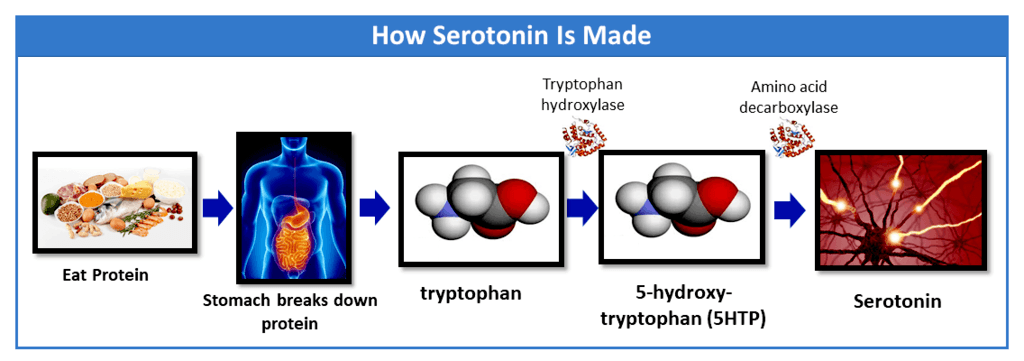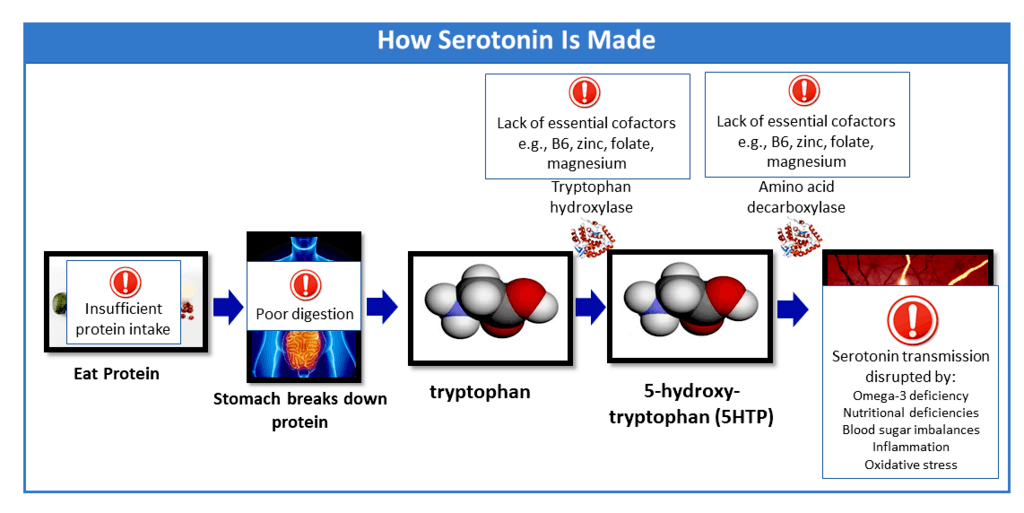
Research confirms that what we eat can have a dramatic effect on how we feel.
There are dozens of studies that show eating a healthy diet is associated with a lower risk of developing depression, anxiety, and other mental health disorders. A healthy diet includes eating lots of vegetables, fruits, nuts, seeds, herbs, spices, healthy fats such as olive and fish oil, and good sources of lean protein [1].
On the other hand, eating an unhealthy diet increases a person’s risk of developing depression, anxiety, and other mental health problems. An unhealthy diet consists of refined white products, sweets, high sugar foods, take-away, soda drinks, processed meats, and foods containing artificial colours and flavours [2].
So how does food affect our mood? Research confirms that most mental health problems are associated with disturbances in several areas. These
Neurotransmitters are brain chemicals that are essential for the transmission of information from one brain cell to another. Neurotransmitters such as serotonin, dopamine, noradrenaline and GABA can all affect our mood, motivation and behaviour. Foods and nutrients are essential for the production of, and the brain’s response to, neurotransmitters.
In fact, this is how one mood-lifting neurotransmitter serotonin is made.

We first eat protein. Our digestive system then breaks this protein down into an amino acid called tryptophan. Tryptophan is then converted into another amino acid called 5-
There are several steps in this process where diet and nutrients are essential. These are shown in the image below [4,5].

Cortisol is our primary stress hormone and having too much or too little of this hormone can affect our mood and general health. What we eat can have a significant effect on our cortisol output. For example, eating high sugar or pro-inflammatory foods such as sweets and takeaway can result in a big surge in cortisol. This can have a detrimental effect on our mood and physical wellbeing. Skipping meals or eating refined foods can also influence cortisol levels [4,5].
On the whole, people with depression and other mental health problems have excess body inflammation. This inflammation is sometimes referred to as silent inflammation as it may not be severe enough to cause pain, redness, and swelling that commonly occurs with acute inflammation. Inflammation is not a bad thing unless it occurs for too long. When inflammation is chronic, it has a detrimental effect on all our organs including our brain. This can lead to mood and mental health problems.
A significant source of inflammation comes from the foods we eat. If we eat processed, unhealthy foods, it will increase inflammatory processes in our body. Eating foods we are allergic or intolerant to can also increase inflammation. On the other hand, foods such as vegetables, fruits, herbs, spice, and omega-3 fats are anti-inflammatory and many of these are associated with better mental health [4,5].
We all produce free radicals during our normal metabolism. Our body uses antioxidants to guard against the damaging effects of free radicals. Unfortunately, people with depression, anxiety, and other mental health problems have been shown to have reduced antioxidant defences and higher free radical damage. This is known as oxidative stress. Oxidative stress is a major problem as it can have a very damaging effect on our brain.
Free-radical fight antioxidants are derived from the foods we eat. Vegetables, fruits, spices, and herbs are all high in antioxidants and can increase the activity of our natural antioxidant defence system [4,5].
Over time all these processes, especially excess inflammation, oxidative stress, and excess cortisol can lead to the destruction of brain cells. Parts of the brain associated with mood and thinking are often the areas adversely affected.
Interestingly, while the foods we eat can protect the brain by reducing inflammation, normalising cortisol levels, and reducing free radical damage, they can also support new neuronal growth or brain plasticity. For example, many foods and nutrients can increase proteins in the brain known as neurotrophins. These proteins are essential for the growth of new brains cells [4,5].
As you can see, the foods we eat and the nutrients we derive from them can affect our mental health through several mechanisms. There is increasing research that confirms improving one’s diet, restoring mood-supporting nutrients, and taking herbs and spices can effectively improve mood in people with anxiety and depression.
So, if you are serious about improving both your mental and physical health, it is essential that you appreciate the importance of your diet.